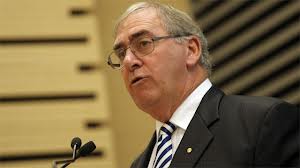February 15 – Anti-doping authorities and FIFA have not always been comfortable bedfellows but both sides put on a positive spin after meeting at the headquarters of world football’s governing body on Thursday.
World Anti-Doping Agency (WADA) president John Fahey (pictured) and his secretary general David Howman met FIFA President Joseph Blatter, secretary general Jérôme Valcke and chairman of FIFA’s Medical Committee Dr Michel D’Hooghe to swop ideas and share expertise in the fight against drug abuse.
WADA recently expressed its disappointment that the use of biological passports, which monitor the effects of doping, is too limited in football with FIFA only recently starting to use them at its competitions over the past two years.
During Thursday’s meeting FIFA reiterated it was totally committed to eliminating the drug cheats and stressed that biological passports would be used both for the Confederations Cup and next year’s World Cup in Brazil.
D’Hooghe disclosed that in 2012, a total of 662 urine samples were taken at FIFA’s competitions and that to date, there has been only one “adverse analytical finding” – at a World Cup qualifier in October 2012 though this was not identified.
D’Hooghe said: “FIFA was the first international organisation for team sport to start with longitudinal profiles. We have been testing this at the FIFA Club World Cup in 2011 and 2012, we will continue at the FIFA Confederations Cup 2013 with blood testing unannounced at training camps and games. And it’s our commitment to have all players participating at the 2014 FIFA World Cup having biological profiles.”
For the 820 World Cup qualifiers, FIFA will carry out doping controls at 114 matches and collect a total of 456 samples. At these selected matches, four players are to undergo a doping control and out of those selected, one is drawn for EPO.
“There is always more which can be done in the fight against doping, but we know FIFA has always been serious in this domain,” declared Fahey in a press statement.
Yet ahead of Thursday’s meeting, unencumbered by protocol, he was quoted as expressing concerns that not enough is being done to discover if footballers are using EPO. “There is a clear indication that in football they are not testing for EPO from urine,” Fahey said. “It’s a tragedy.”
Contact the writer of this story at moc.l1745596497labto1745596497ofdlr1745596497owedi1745596497sni@w1745596497ahsra1745596497w.wer1745596497dna1745596497

